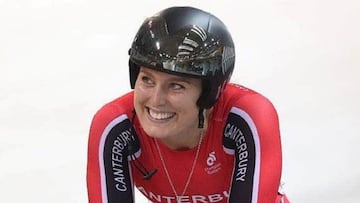NZ Olympic cyclist Olivia Podmore, 24, found dead at home Monday
The sudden death of the 24-year-old cyclist after citing sport and competition pressure has shocked the world, reigniting the debate on athletes' mental health issues.

The ongoing mental health struggles athletes suffer have been topping headlines since tennis player Naomi Osaka withdrew from the French Open and US Gymnast Simone Biles also pulled out of the majority of the events she qualified for at the Tokyo Olympics.
Now, the world is shocked with the sudden death of Olivia Podmore, a cyclist who rode in Rio 2016 for New Zealand. According to a New Zealand police spokesman, police attended a sudden death at a property in Waikato on New Zealand's upper North Island on Monday afternoon.
Words can’t express how saddened we are to hear of the sudden death of Rio 2016 Olympian, Olivia Podmore.
— UCI Track Cycling (@UCI_Track) August 9, 2021
Our thoughts are with her family, friends and @CyclingNZL. RIP 🤍 pic.twitter.com/i1sKCI1CsM
The 24-year-old’s cause of death has not been revealed. However, everything points to suicide as the main cause after one of Podmore’s friends raised concerns over her mental health stating the fact that the young cyclist tried to look for help at the support services offered for athletes.
Podmore participated in the 2016 Rio Olympics as well as in the Gold Coast 2018 Commonwealth Games, but she didn’t manage to qualify for this summer’s Tokyo Olympics.
Olympic rower Eric Murray, Olivia’s friend and fellow medalist, reportedly spent her final days with Podmore, his boyfriend and one more friend snowboarding in Queenstown before the tragic event.
"I wish she had said something," the 39-year-old said in Cambridge. "We have lost a sister, a friend and a fighter who lost that will of fight inside of her.
“I was the last person to see her alive. If you had seen her in the last 72 hours, you wouldn't have thought this could happen.
Eric Murray
"That's why there's so much talk about mental health at the moment."
He also talked about the cyclist’s last post made hours before the death, in which Podmore described the mental strain sport can place on you as well as the pressures athletes are put through, before deleting it.
"The feeling when you lose, when you don’t get selected even when you qualify, when your injured, when you don’t meet society’s expectations such as owning a house, marriage, kids all because [you’re] trying to give everything to your sport is unlike any other."
Olivia Podmore
“With Olivia’s final words she left us a message - a message we wish will never have to be read again by anybody else,” said Murray.
Related stories
After this unfortunate event New Zealand’s cycling federation spokesman has said they will review its mental health support for athletes to analyze what went wrong.
Cycling New Zealand chief executive Jacques Landry added, “Right now for us it’s about focusing on the well being of the people who are here and having to deal with this loss.”
We at Cycling New Zealand are deeply saddened with the sudden loss of our young cyclist Olivia Podmore.
— Cycling New Zealand (@CyclingNZL) August 10, 2021
Be kind to each other and take care of one another ❤️https://t.co/bN1RfXen1J


